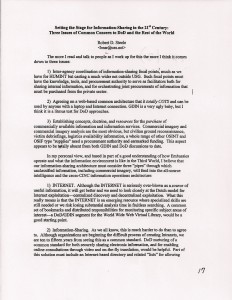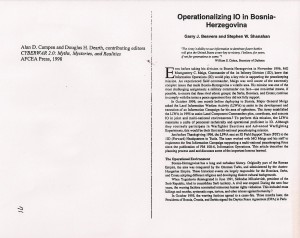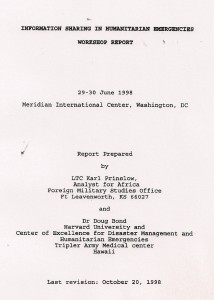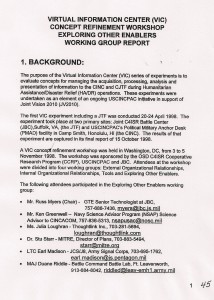PDF: 1999 Setting the Stage for Information Sharing in the 21st Century
1998 Open Source Intelligence: Private Sector Capabiltiies to Support DoD Policy, Acquisition, and Operations
Articles & Chapters, Articles & Chapters, Military, Reform, TechnologiesThe below reference and article was drafted by Robert Steele with some editorial assistance from Mark Lowenthal, who was briefly an employee of OSS before jumping to SRA International. The article draws on the experience of the Marine Corps Intelligence Center (MCIC) that was established by General Al Gray, USMC, then Commandant of the Marine Corps, largely to support expeditionary acquisition. The Army, the Navy, and the Air Force are all “big system” services, and while the Army has begun to learn how to “eat the tail” and reduce the logistics footprint (as well as the ground convey exposure and expense), the reality is that DoD acquisition remains totally hosed today, and 20,000 new people (as planned by Secretary of Defense Robert Gates) are not going to be effecive for three reasons:
1. DoD makes policy without regard to strategy or intelligence
2. DoD acquires systems without regard to strategy, lacking a strategic analytic model
3. DoD is long over-due for massive changes to Title 109 such that we have four proponents for Big War, Small War, Peace War, and Homeland Defense (each of the Services could be redirected appropriately) but–big but–the regional combatant commanders become BOTH the hubs for Whole of Government inter-agency planning, programming, and budgeting AND the primary proponents for what is needed in their theaters.
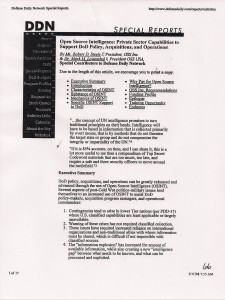
Should it not be crystal clear, the “butts in seats” approach in which contractors cost the taxpayer 250% of their salary is not sanctioned by this early article on how to fix intelligence support to acquisition. Small cells, a global grid of multinational sharing and sense-making partners, and the ability to “know who knows,” to apply strategic analytic tradecraft, and to produce “just enough, just in time, just right” Open Source Intelligence (OSINT) that either stands on its own or radically enhances all-source intelligence production, are the way to go. No one now providing OSINT under OMB Code M320 understaqnds how to do that.
1998 Politi (IT), Becher (DE) et al, Toward a European Intelligence Policy (Chaillot Paper 34)
Historic Contributions, Policy, White Papers
This is one of the important papers from the 1990's. The European Union (EU) never really got its intelligence act together, and shows no signs of doing so today as this is loaded (2009). Editor Alessandro Politi coined the term “intelligence minuteman” in 1992, and is one of the leading minds in Europe on intelligence with integrity.
Eventually we must have a global intelligence network and policy, perhaps rooted in a United Nations Open-Source Decision-Support Information Network (UNODIN).
In the meantime, this paper is as good a review as any of why regional intelligence policies matter and are needed.
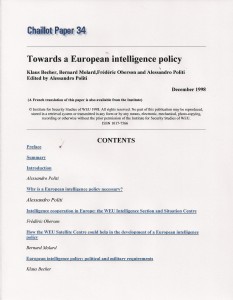
1998 Beavers (US) & Shanahan (US), Operationalizating Information Operations (IO) in Bosnia-Herzegovina
Articles & Chapters, Historic Contributions, InfoOps (IO)1998 Talking Points on Hackers
Briefings (Core), Briefings & Lectures, Collective IntelligenceClick on above fpr talking points used for the Jane Wallace show in 1998. Hackers are an advanced form of Collective Intelligence.
There are three main hacker networks in the Western world, all open and legal: Hackers on Planet Earth (HOPE) based in the New York City area; Hackers/THINK Conference based in Silicon Valley, and Hac-Tic, the European network that includes Germany's CHOAS Computer Club, which meets in The Netherlands on alternating years with HOPE.

